After the Boer War a cricket club was formed and played in Brandywell, Londonderry under the name of Idlers - and in 1908 Idlers lost to Clooney CC in the North West of Ireland Senior Cup Final. In 1909 Idlers moved from Brandywell to Upper Duncreggan (opposite the Londonderry High School) and re-named the club City of Derry and enjoyed some early success by winning the North West of Ireland Junior League in 1912 and Junior Cup in 1913.
City of Derry were defeated in Senior Cup finals in 1910, 1913, 1914 (in the 1914 final against Sion Mills, City only required 22 runs to win but were dismissed for 12 runs). In the Senior League, City finished runners up in 1911 to Sion Mills and then in 1919 City and Sion were involved in the first-ever league "Test Match" and Sion won this league decider thanks to a match winning innings of 75 not out by the incomparable Andy McFarlane, then a young 20 year-old and he was carried shoulder high from the wicket by jubilant Sion supporters.
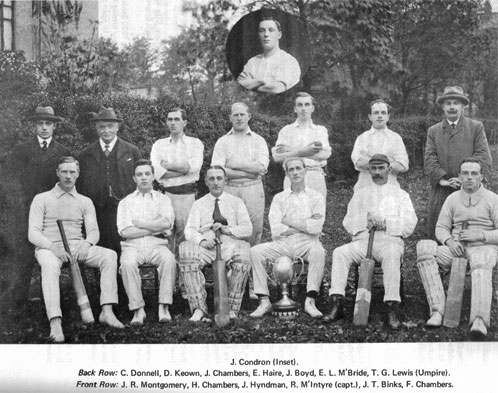 The 1920 NWCU Senior Cup winning side
The 1920 NWCU Senior Cup winning side
It was not really until after the First World War that City of Derry emerged as a major force in North West senior cricket and the 1920's and early 1930's was a golden period of successes in the history of the club. After losing in four previous Senior Cup finals, City finally triumphed in 1920 with further wins in 1922, 1923, 1924, 1929, 1932 and 1933 with City also winning the Senior League in 1921, 1922 and 1924 and runners-up in 1926, 1927 and 1928. During these years of success City was well served by such players as, the brothers Freddy and Herbie Chambers, Johnny Boyd, Bertie McClelland, J R Fanning, John Condren. Dougie Caldwell, sen. Archie McCandless, Willie Caldwell and Bobbie McKeegan.
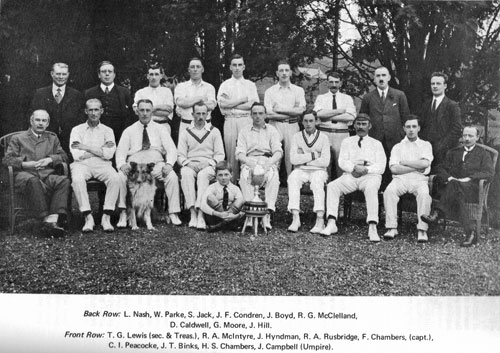 The 1922 NWCU Senior Cup winning side
The 1922 NWCU Senior Cup winning side
Freddy Chambers gave outstanding service to the City club, a solid opening batsman he laid the foundation for many a City score and he was also a most astute captain who led the club to many successes. John Boyd was one of the most outstanding bowlers in the North West in the 1920's, a most accurate medium-pace bowler he performed many remarkable bowling feats.
The honour of scoring the first century for City in competitive cricket went to Willie Jeffrey, a player who played most of his career with the Brigade club - when playing for City in the season 1924, Jeffrey a most forceful and hard hitting batsman with an aggressive approach, which made him a great favourite with the crowds, scored 117 not out in a very short time in a league match against the Royal Sussex. In his innings Jeffrey hit 10 sixes and 8 fours and this player played a prominent role that season in assisting City to win the elusive double, League and Cup.
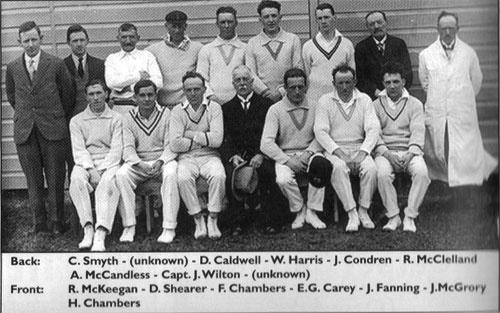 At the ground opening in 1927
At the ground opening in 1927
On the 18th June 1927 City moved to their new ground at Lower Duncreggan, their final home and on that day the ground and pavilion was officially opened by Mrs J C Donnell. Before a very large crowd City entertained their great rivals Sion Mills in a league match with City most surprisingly dismissing Sion for 25 runs with 19 of these coming from Andy McFarlane. City passed Sion's score without loss of wicket.
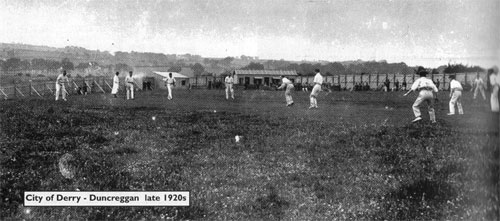 Duncreggan in the late 1920s
Duncreggan in the late 1920s
The season 1927 was to be a milestone in the history of the club for a young unknown Englishman names Edgar Donald Reid Shearer joined the club and in later years when he became most famous he was to be referred to simply by the initials "EDR". EDR Shearer played for City in the seasons 1927 and 1928 when his performance as a batsman was somewhat moderate in comparison to his outstanding batting achievements of later years and after the 1928 season he returned to England.
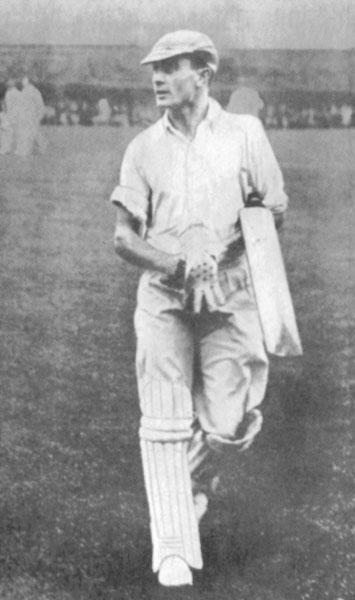
In all Shearer scored 11 centuries during his career with City and in 1939 he left to join the Services in the Second World War he did not return to the North West again. After the war he was to reside in the Belfast area where he resumed his brilliant cricketing career with N.I.CC and it was with that club in 1951 he returned in a Northern Union Cup match to Sion Mills and he thrilled the crowd present with another classical century - where in the same ground in 1934 he scored a century for the North West against the touring side Lancashire.
EDR Shearer was equally talented at football. He won an Amateur Cup Medal with the famous Corinthians club as well as representing the English Amateur International team on seven occasions and he also represented Great Britain in Berlin in the 1936 Olympic Games. A dashing fearless skilful centre forward he was a most prolific goal scorer in the Irish League when playing with Derry City Football Club.
Shearer represented the Irish League on 9 occasions and he was an important member of great the Derry City team of the 1930's and he became a great favourite with the Brandywell crowd. On a Saturday afternoon in August 1936 EDR Shearer performed a most unique sporting double - he played football for Derry City in the Brandywell in a league match against the famous Belfast Celtic and immediately afterwards rushed off to Duncreggan to play cricket for City against Strabane and was on the winning team both times.
It was mainly through EDR Shearer's association with Derry City Football Club that a relationship developed with City of Derry Cricket Club which resulted in both clubs playing an annual friendly cricket match at Duncreggan and also Derry City's greatest ever player Jimmy Kelly and another footballer Jimmy McCann played regularly for the cricket club and featured on winning teams.
After their great successes in the 1920's City of Derry moved into the 1930's and although their great rivals Sion Mills defeated them in the 1931 Senior Cup final, City came back to win the Cup in 1932 and 1933. In 1932 Shearer had fine scores including a 95 and a 99 and it was in the Senior Cup final he was to score his maiden century with City as well as making history by scoring the first century in a Senior Cup final. That same season he became the first North West cricketer to be selected for Ireland. In the 1933 Senior Cup semi-final with Killaloo, Shearer made the magnificent score of 233 runs. City went on to beat Strabane in the final that season and a feature of the final was the performance of City player Rev. Gilbert Smyth, who in the first innings caught the first five Strabane batsmen in the slips.
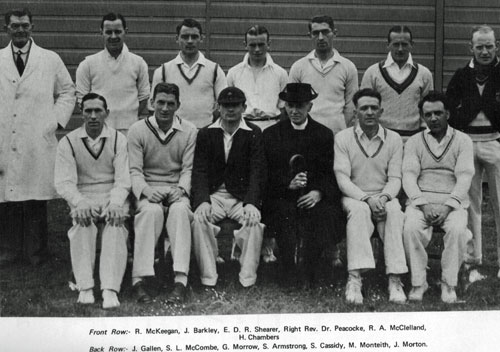 The 1936 City of Derry team
The 1936 City of Derry team
Although 1933 was the last time City of Derry Cricket Club won the Senior Cup they nevertheless were a force in senior cricket in the 1930's with Shearer to the fore ably assisted by the Chambers Brothers and the fine swing bowling of Bertie McClelland. In the 1934 season R W Moore, an Irish International from Cliftonville joined City and a fine attacking batsman, he turned in many fine displays for City - in the 1935 Senior Cup final against Sion Mills, Moore scored the fastest century in a final in 75 minutes and yet City lost to Sion. Another record was achieved by City players when against Killaloo CC Moore scored 101 not out and Shearer 102 not out. The famous Willie Jeffrey was another attraction at Duncreggan that season and when Brigade visited Duncreggan in a league match he entertained the large crowd present with a typical display of power hitting, scoring 132 runs in a very short time, his former colleagues being at the receiving end of his onslaught.
New faces appeared in the City team in the latter part of the 1930's such as Stanley McCombe, George Stewart, George Morrow, Bryson McCarroll, George Gallen and Freddy Moore and in the 1939 season City had the services of the talented Armagh International all-rounder Jack Barnes. City lost to a very strong Brigade team in the 1939 Senior Cup final with Brigade's great stalwart and outstanding bowler Willie McGarvey taking 6 second innings wickets for 64 runs to give Brigade victory.
At the outbreak of the Second World War, City lost a number of players who joined the Services, the most notable being EDRShearer and as well it seen the retirement of such long-serving players as the Chamber brothers and Bertie McClelland. City again reached the Senior Cup final in 1941 but lost to Strabane - this was to be the last time City of Derry appeared in a Senior Cup final.
In the first round of the Senior Cup in 1943 City were dismissed by Waterside CC for 10 runs, their lowest score on record, with George Stewart scoring 9 of these runs. Andy Logue, the Waterside all-rounder was in devastating form claiming 8 wickets for a mere 6 runs. Scott Huey commenced his North West cricketing career with City in the mid 1940's but business commitments on a Saturday prevented him turning out for City on a regular basis and he was soon to join Eglinton CC , where during his long career with Eglinton he was to make history by performing many outstanding bowling feats as well as making a most significant impact at international level.
Under the captaincy of the Rev. Jack Pedlow, City won the Faughan Valley Cup in 1945 and 1946 as well as winning the Senior League in 1946. There were a number of players who featured in these successes, a few whose names were to become synonymous with the City club; Wallace Allen an outstanding cricketer and City's best in post war years, a stylish stroke player with power and a fine player of spin bowling, he won international honours with City and in all he scored 4 centuries, his top score being 176 not out in the 1946 Faughan Valley Cup final. During the 1940's he was a most successful medium-pace swing bowler as well as being a much respected batsman whose ability as such must surely entitle his name to be included in the list of all-time greats of North West cricket.
Edwin McKerr was an outstanding free-scoring batsman who over his long career with City scored many runs, his top score being 124 against Cliftonville and he also rendered many years of valuable service in the administrative affairs of the club.
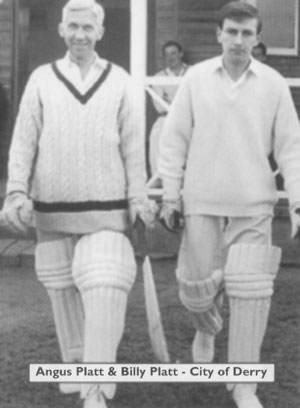
Raymond Platt was City's hero with a remarkable bowling performance of 7 wickets for 11 runs in eight and a half overs while Angus Platt took 3 for 13 runs. In his career with City as a spin bowler Raymond Platt was most successful, with his best bowling performance being in the season 1944 when in a league match against St Johnston CC he took 8 wickets for 9 runs.
Angus Platt gave most remarkable service to City of Derry Cricket Club - in all he played 30 years for the senior team and rarely if ever missed a match. After his brother Raymond retired in 1949 he was the leading spin bowler and mainstay of the City bowling attack for many years. As he played in the same era as the two exceptional leg spinners Scott Huey and John Flood, he was somewhat overshadowed and under-rated but he was in his own right a very fine bowler. His slow well-flighted off spin bowling claimed many wickets and there was no better off-spin bowler in post was cricket. He was also a talented batsman with two centuries to his credit.
Abe Simpson, as a most accurate pace bowler, performed many fine performances for the club and he has the proud distinction of being the only City bowler on record to have performed that most rare of all bowling feats of taking all 10 wickets in a match. He performed this feat in 1939 when as a young bowler with the City of Derry Intermediate team in a league match against Waterside CC he took all 10 wickets for 16 runs.
These players were very much to the fore in the 1950's and were joined by a number of other well known North West cricketers, Tommy Orr, Bristow Stevenson, Reggie Jeffrey, David Todd, Jim Wallace and North of Ireland player Scott McLurg and during this period City had a team capable of winning trophies but their best effort was to was to finish as Senior League runners up in the 1954 season. It has always been difficult to understand why City was without success since they last won the Senior League in 1946 despite the fact that over the years they had some very talented players although there has always been an opinion that luck deserted the club in crucial fixtures. However success did come to Duncreggan perhaps in a more humble level of cricket when in 1957 under the supervision of Cecil McClure, the Boys team won the Boys League and Cup competitions.
The late 1950's and 1960's saw a number of young players join the club and these players were to serve City well - Ernie Falconer, Roy Stewart, Billy Platt, Raymond Robinson, Benny Smyth, Raymond Robinson, Tommy McBride, Hazlett Ross, Scott Kelso, Sonny Nichol,David Rankin, Alan McClure, Markie McGonagle. It was around this period that a series of meetings were held between the cricket club and the City of Derry Rugby club with a view to the amalgamation of the two clubs, but such meetings in the end did not mount to anything.
The City club was most strong in membership in the late 1960's and early 1970's and a fine boy's team developed under the guidance of club stalwart Lexis Miller won the Boy's League and also during this period the club was able to field four teams to take part in the annual inter -club competition, the Wightman Cup. The depth of playing strength then in the club was illustrated when in the 1969 season the club found itself in the unique position with two City teams competing on the same day in the semi-final stages of the Senior and Intermediate Cup competitions - but neither team winning on the day.
As the club moved into the 1970's and the Troubles began to escalate thus commenced the movement of population from the city side of Londonderry to the Waterside area and it was then the club started to dwindle in membership, with members joining other clubs. However nobody could have foreseen the complete transformation that was to take place within the City club in a period of a few years.
For over a three-year period the club had to endure a vendetta of thuggery of a most blatant sectarian nature. As a result the grounds were consistently vandalised, the pavilion was burned down, sectarian slogans plastered everywhere, the palings surrounding the ground were torn down and toilets destroyed and equipment damaged. Gangs of youths used the ground as a public park for football making cricket practice practically impossible and probably worst of all junior players and officials were subjected to scurrilous abuse of a most sectarian nature. Such happenings had a most disastrous effect.
It resulted in more members leaving the club at an alarming rate and finally drove the club into extinction. It was difficult to understand why the behaviour of the youths was motivated by bigotry and yet City of Derry cricket club was well known as a non-sectarian club. The club had drawn members from all religions in its 70 years of existence and this was maintained in the final years of existence of the club.
In the 1974 season the City senior team was relegated to Section B of the Senior League and the boys team ceased to exist and the loss of members resulted in the club in seasons 1976 and 1977 just being able to field one team, this being in Section B of the Senior League.
Despite the weakened state of the club it was determined to carry on in the season 1978 and enter the one team in the B Section of the league but with only eight players available for the first league match an emergency committee was called on Wednesday 28th April 1978. The committee made the only decision possible to disband the club and whilst such a decision was inevitable it was nevertheless made with regret by the members present who had remained most loyal and dedicated under the most trying circumstances to the club until the very end.
During these final years the club was well served by such players :- the long serving Benny Smyth, Raymond Robinson, Davy Hamilton, Tommy McBride, Markie McGonigle, Sonny Nicholl,Billy Ayton, Ronnie McCausland, Ernie Falconer, John Falconer and Paddy Armstrong.
